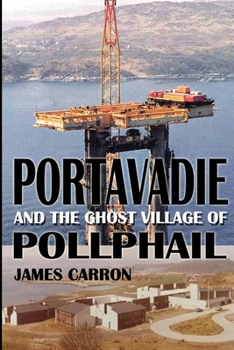Portavadie and the Ghost Village of Pollphail
The landscape of Scotland is littered with lost communities, most emptied during the notorious Highland Clearances. But there was one abandoned village that dated from much later - the mid-1970s. It was called Pollphail and it was a legacy of the early optimism of the North Sea oil boom.
Mired in financial scandal and branded an expensive white elephant, it was for decades, prior to its demolition, an uncomfortable reminder of the cost of failure.
It differs from the historic lost villages of the Highlands and Islands, which were forcibly cleared of their residents, in that Pollphail was never occupied. No one ever lived here and there is no evidence to suggest anyone ever even spent a night under its roofs. The only long term occupants were the sheep, rabbits and bats that found their way in after the place was bequeathed to nature and the elements.
Located on the southern tip of the Cowal peninsula, on the west coast of Scotland, Pollphail was built at the taxpayers' expense amid the early days of the North Sea oil and gas boom. It was designed to house an army of migrant workers.
But the men never came and for over four decades this fully equipped company town lay empty. The reason was close at hand; less than half a mile away, at Portavadie, multi-million pound concrete oil platforms were to have been constructed in a vast man-made lagoon. But a sudden sea change left the venture high and dry. And the whole place was simply abandoned.
Fully illustrated with photographs, maps and plans, this history charts the rise and fall of Portavadie and Pollphail from the mid-1970s to the present day, exploring the reason why the project failed so spectacularly and the legacy it left in its wake..
Mired in financial scandal and branded an expensive white elephant, it was for decades, prior to its demolition, an uncomfortable reminder of the cost of failure.
It differs from the historic lost villages of the Highlands and Islands, which were forcibly cleared of their residents, in that Pollphail was never occupied. No one ever lived here and there is no evidence to suggest anyone ever even spent a night under its roofs. The only long term occupants were the sheep, rabbits and bats that found their way in after the place was bequeathed to nature and the elements.
Located on the southern tip of the Cowal peninsula, on the west coast of Scotland, Pollphail was built at the taxpayers' expense amid the early days of the North Sea oil and gas boom. It was designed to house an army of migrant workers.
But the men never came and for over four decades this fully equipped company town lay empty. The reason was close at hand; less than half a mile away, at Portavadie, multi-million pound concrete oil platforms were to have been constructed in a vast man-made lagoon. But a sudden sea change left the venture high and dry. And the whole place was simply abandoned.
Fully illustrated with photographs, maps and plans, this history charts the rise and fall of Portavadie and Pollphail from the mid-1970s to the present day, exploring the reason why the project failed so spectacularly and the legacy it left in its wake..
Format:Paperback
Language:English
ISBN:B09HL95L6H
ISBN13:9798491022373
Release Date:October 2021
Publisher:Independently Published
Length:84 Pages
Weight:0.27 lbs.
Dimensions:0.2" x 6.0" x 9.0"
Related Subjects
History












